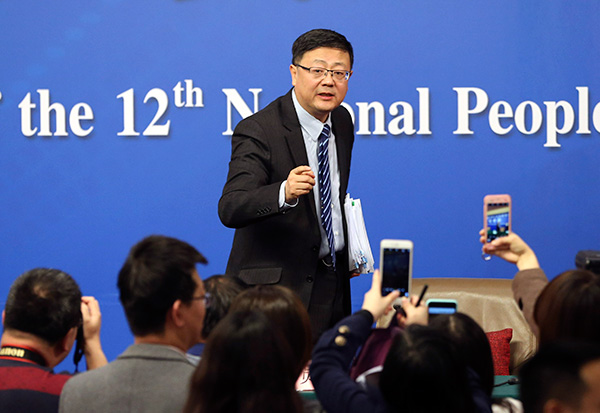Harsher measures will target smog
By Zheng Jinran (China Daily) Updated: 2017-03-10 08:02Curbs to include more efforts to reduce coal for heat
Curbing winter smog in the north has become a priority and challenge for air quality improvement, leading to harsh measures this year, the environmental minister said on Thursday.
Measures will include more efforts to reduce coal consumption for heating, stricter laws and regulations on environmental protection, and more inspections to deter polluters and push governments to fulfill their duties in reducing pollution.
"The central government will take harsher measures to curb winter smog in the north this year, especially by implementing fully the efforts in reducing coal consumption for heating," said Chen Jining, minister of environmental protection, during the ongoing plenary session of the National People's Congress.
Although the average concentration of PM2.5 - hazardous airborne particulate matter with a diameter of 2.5 microns or less - has decreased by 9.6 percent over the past three winters in the Beijing-Tianjin-Hebei region, several bouts of severe smog hit the region since autumn last year, causing another round of national debate.
In contrast, PM2.5 levels dropped by at least 20 percent over the same period in the Yangtze River Delta and the Pearl River Delta.
Besides weather conditions in the north that were not conducive to dispersing pollutants, other critical factors were excessive discharges of pollutants from industrial production and consumption of coal.
The minister said previous control measures are proving effective, with large drops in pollutants. These measures were mainly those listed in the national campaign against air pollution, with specific requirements since 2013 for lowering pollutant emissions.
Though the concentration of PM2.5 dropped slowly this past winter, the Beijing-Tianjin-Hebei region's annual average PM2.5 concentration last year was 33 percent lower than in 2013.
The new Environmental Protection Law, which took effect on January 1, 2015, presented environmental authorities with more weapons to fight polluters, said Tian Weiyong, head of environmental inspection for the ministry, in previous statements.
Data from the ministry showed that, based on the new Environmental Protection Law, 2,465 polluting companies were shut down last year, and environmental authorities at all levels levied fines totaling 6.63 billion yuan ($959 million) on the polluters, a year-on-year increase of 56 percent.
Additionally, inspection teams sent by the central government reviewed 16 provincial-level regions last year.
Governments that fail to protect the environment as required will face punishments as well, he warned.
Despite the challenge, Chen was confident that China can solve pollution issues faster than developed countries.
"Many of them have spent 20 to 40 years, or even 50 years, to solve air pollution," said Chen. "It's hard to solve air pollution (in China) within two to three years. ... I can assure you that we can solve the air pollution issues faster than the developed countries."
zhengjinran@chinadaily.com.cn
 |
|
Chen Jining, minister of environmental protection |
- 'Cooperation is complementary'
- Worldwide manhunt nets 50th fugitive
- China-Japan meet seeks cooperation
- Agency ensuring natural gas supply
- Global manhunt sees China catch its 50th fugitive
- Call for 'Red Boat Spirit' a noble goal, official says
- China 'open to world' of foreign talent
- Free trade studies agreed on as Li meets with Canadian PM Trudeau
- Emojis on austerity rules from top anti-graft authority go viral
- Xi: All aboard internet express











